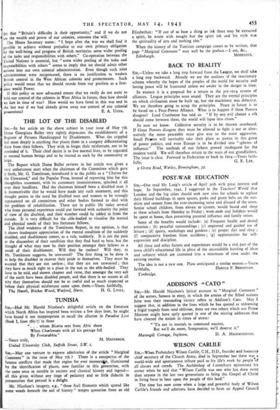WEST AFRICAN COLONIAL POLICY .
SIR,—Whilst there are many excellent administrators in West Africa itself, the actual colonial policy is directed from London. A continuous policy of appeasement towards the demands of a handful of educated natives has resulted in the whole of the illiterate population getting wages which have exceeded their wildest dreams. This has not resulted in more efficient work from them, but it has had the direct effect of increasing prices so that the Controller of Merchandise is busy issuing new control orders. Nevertheless, the cost of living has advanced, and go per cent. extra cost of living allowance has been given to the natiN'es in addition to their previous wage increases. No advance of pay, however, has been given to Europeans who are therefore directly penalised.
It is worse than useless just to throw money at the natives and by so doing to imagine 'that one is carrying out the responsibilities of government. It is up to the Government to provide more hospitals, schools, &C., and not to leave such tasks to missionaries. Also, as the Home Secretary states: " It would be ignorant and dangerous nonsense to talk about grants of full self-government to many dependent territories for some time to come. It would be like giving a child of ten a latch- key, a bank account and a shot-gun."
The shareholders of one large trading monopoly are the people who get all the wealth from West Africa today. If the British Government took possession of West Africa, developed it, restricted the profits of trading monopolies, instituted export duties and preferential trade agree- ments, the resultant wealth could be used, first, for the development of the colonies and, secondly, for the benefit of Great Britain and the world in general. The Home Secretary says: "The British Government puts lots of money each year into the colonies and seeks no commercial return." This is certainly unselfish, but it is also irresponsible._ Is not the Britisher out of work at home entitled to a share of the surplus colonial wealth as well as the African native? It is nonsense to say we must not derive any benefits ourselves from the colonies. It is the British Government's responsibility to create and use our colonial wealth.
The idealism of trusteeship is the ultimate goal, but only when the time has arrived when these natives have proved that they will be loyal to us in time of need, and not back out of their responsibilities as in Indisi today. It must be remembered that other growing nations have felt that "Britain's difficulty is their opportunity," and if we do not use the wealth and power of our colonies, someone else will.
The Home Secretary states: " I hope after the war we shall find it possible to achieve without prejudice to our own primary obligation for the well-being and ptogress of British territories some wider pooling of the tasks and responsibilities with others." Co-operation between the United Nations is essential, but "some wider pooling of the tasks and responsibilities with others" seems to imply that we should admit other nations into our own colonial administration. Even though such joint administration were reciprocated, there is no justification to weaken British control in the West African colonies and protectorates. Such policy would mean that we should recede from our position as a first- dass world Power.
If this policy as now advocated means that we really do not want to hold our control of the colonies in West Africa in future, then how should we fare in time of war? How would we have fared in this war and in the last war if we had already given away our control of our colonial



























 Previous page
Previous page